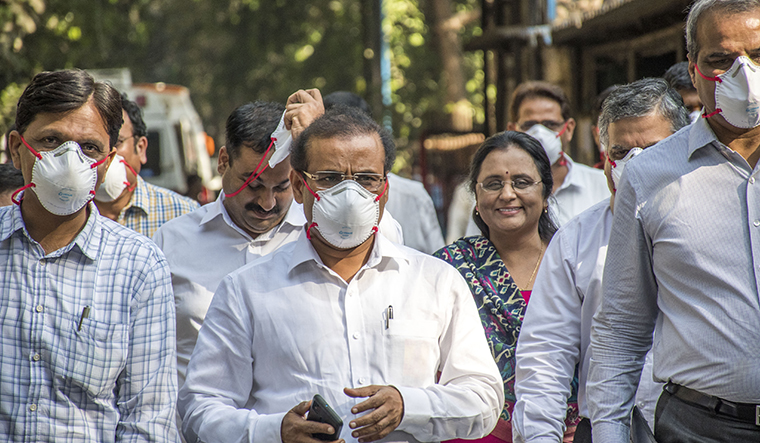When the going gets tough, the tough get going. Maharashtra Health Minister Rajesh Tope knows this very well. Despite facing a medical emergency on the family front—his mother has been in intensive care for more than six weeks now—Tope has been working tirelessly to contain the Covid-19 outbreak in the state.
A senior Nationalist Congress Party leader, Tope was a bit surprised when he was asked to take charge of Maharashtra’s health ministry last year. An engineer by training, Tope was minister of higher and technical education in the Congress-NCP government that was in power from 2009 to 2014. Never one to shy away from challenges, he is now on the ball as health minister.
He was the first Maharashtra politician to suggest a statewide lockdown to fight the contagion. His concern was that Maharashtra could become India’s Covid-19 epicentre as Mumbai was the commercial capital of the country. “I have asked the health department to focus on three Ts—tracing, testing and treatment,” Tope told THE WEEK. “Corona spreads very fast, but thankfully the mortality rate is just around 2.5 per cent. Social distancing was one of the most important measures that we initiated early enough by closing schools and postponing exams. Finally, we imposed curfew.”
With the restrictions on travel, he said, the health department is now trying to trace the people contacted by those who came from abroad. “We are ensuring that they are quarantined and that those showing symptoms are tested immediately,” said Tope. “Those who test positive are immediately being treated. We have teams in all districts implementing the three Ts strictly.”
There are now 13 labs for Covid-19 testing; seven more will be operational soon. “We have decided to set up a dedicated Covid-19 hospital in every district,” said Tope.
The health department has prepared a detailed action plan to procure critical care equipment to treat the growing number of patients. “Fortunately, 85 per cent of infected patients can manage with a treatment protocol that focuses on boosting their immunity,” said Tope. “The remaining 15 per cent are critical patients who will require intensive care and ventilators. Adequate planning and care has been taken to ensure that they are available in all districts. I don’t think we will face any problem. Even private hospitals will help us. In any case, we have the powers to take over a private hospital or its ICU under the Epidemic Diseases Act of 1896.”
Tope said the outbreak has led to a shortage in blood supply, as donation camps are not being held. The reserves in the state could run out in the first week of April. What is worrying him more is the fact that doctors in rural areas have stopped seeing patients fearing contagion. “Even doctors are afraid that someone suffering from fever and cough could be a Covid-19 patient,” he said. “Clinics are also being shut because of lockdown and curfew. We have appealed to all private doctors to face this crisis without fear and as a team. We have also given instructions to the police and district administrations to ensure that clinics and medical shops remain open all through the lockdown.”
According to him, the Union and state governments have been coordinating well to mitigate the crisis. “We have had a health ministers’ conference with the prime minister,” said Tope. “We also keep interacting with Union Health Minister Dr Harsh Vardhan every couple of days. We have urged him to make more N-95 masks available to us, and told him that he should ask industrialists to make N-95 and PPE (personal protective equipment) in India.”
Former Maharashtra health minister Suresh Shetty said he had been giving suggestions and feedback to Tope and health department officials. “The need of the hour is to rope in experts from private sector,” said Shetty. “We also need to carry out mass testing, like it was done in South Korea. A team of private doctors and Maharashtra Home Guards can go to localities where poor people live and encourage them to undergo tests. We are now testing those who are coming to government facilities; health care providers should instead reach out to people to prevent the spread.”
Neonatologist and public health activist Dr Amol Annadate feels a lot more can be done. “In rural parts of the state, there is a lack of micro and macro planning,” he said. “Many grassroots doctors fear that community transmission has begun. It is impossible to assess community transmission unless we test enough. Our low testing capacity makes it impossible to follow protocols, thereby increasing the threat of underreporting.”
Political analyst Abhay Deshpande said Tope was handling the crisis in an effective manner. “He is leading the battle from the front—visiting hospitals and regularly interacting with doctors and experts. As a result, there is no panic in the health department,” said Deshpande. “Tope is also communicating directly to people through platforms like Facebook Live. He has asked the health department to prepare a detailed plan to set up nearly two lakh beds for Covid-19 patients. This involves converting government rest houses into hospitals. As Tope is showing a lot of initiative, Chief Minister Uddhav Thackeray has given him full freedom to run the department.”


